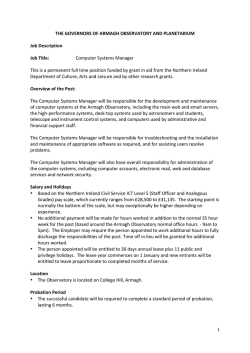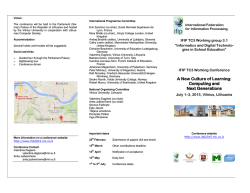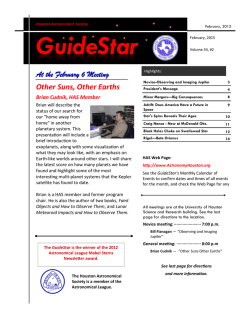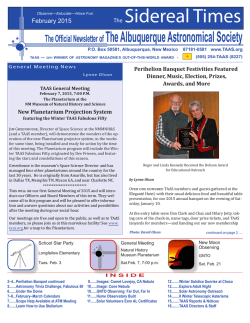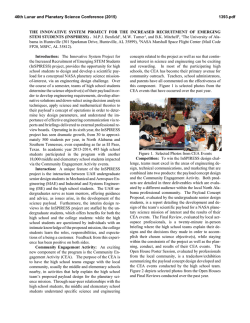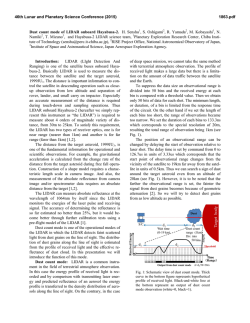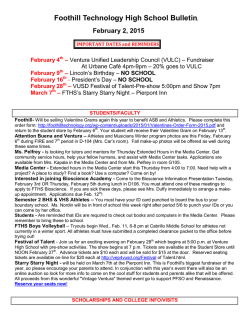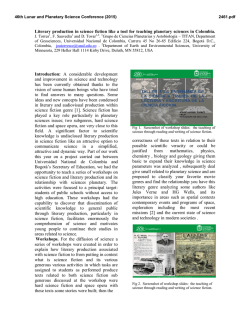
ASTROSPACE EDUCATION IN MODERN PLANETARIUM. E. N.
46th Lunar and Planetary Science Conference (2015) 1390.pdf ASTROSPACE EDUCATION IN MODERN PLANETARIUM. E. N. Tikhomirova1 and М. N. 2 1,2 Gorodenskaya , Valentina Tereshkova Cultural and educational centre, Tchcaikovskogo st., 3, Yaroslavl, Russia, 150000; [email protected]; [email protected].. Introduction: Life of modern person integrally connects with space technologies such as mobile telephony and personal computers with access to the Internet, multi-channel digital TV, on-board automobile navigation satellite system and many others. At the present time educational technologies, connecting with astrospace researches in one way or another, are of interest. Half a score of educational programs of University and school level, raising the questions of gravitational biology, space agricultural sciences and life in the Universe are known today. Valentina Tereshkova Cultural and educational centre: Valentina Tereshkova Cultural and educational centre is a modern cultural and educational complex including the planetarium, the museum of the history of cosmonautics, the astronomical observatory, the interactive classroom for astronomical study group, media café “TRANS – FORCE”. The outreach and educational work is carried out with a population of different age and social groups on the basis of the Centre. Now Valentina Tereshkova Cultural and educational centre develops project of astrospace education and awareness of the younger generation Russia [1-3]. Organization of work “Dialogues of the cosmos”. It is supposed to hold a series of lectures about the necessity of space exploration (preservation of the environment and rational use of natural resources, stimulation of economic development through the creation and implementation of new materials, technical means and methods, the development of new fields of activity; ensuring national security and development of international cooperation; increase of national prestige and pride, education level, culture and spirituality). Possible forms of work: lecturing by astronauts, answers to questions from the audience (12+), “microconferences” devoted to research of outer space, carrying out astrospace contests and competitions. Organization of physics lessons from space for gifted children. It is expected to develop a cycle of modern lessons in physics in the spacecraft cabin, on the following sections: mechanics, thermodynamics, electrodynamics, optics, atomic physics. The children, having passed selection round, will participate in an interactive lesson, where the astronaut in orbit will be in the role of teacher (as the teacher). The interactive class of the Centre is specially created for such lessons on space (astronomical) theme. Organization of work of the young astronauts’ Group. It assumed to create a group of boys and a group of girls (10-15 people in each one). The groups will be engaged in search and research work, development of theoretical knowledge in the field of aviation, astronautics, astronomy using the richest material of the museum “History of Cosmonautics” of Valentina Tereshkova Cultural and educational centre and other museums. The Star hall (planetarium) of the Centre allows for any weather, at any time of day and year, at intervals of thousands of years - "travel to the future and the past" – to demonstrate the starry sky, and observed in different parts of the globe. Besides the starry sky, there are ample opportunities for studying of Solar system, planets, and comets, fireballs, meteor showers, and others. The deep sky objects can also be represented using specialized software and digital optical systems. Thus, the proper use of the grand demonstration opportunities of planetarium using traditional and innovative techniques is the guarantee not only of high interest to the presented material, but also attraction of youth to activity in space and astronomical researches. The astronomical observatory of the Centre promotes to the acquisition of practical skills for working with astronomical devices. Conclusion: According to the new state educational standards aimed on formation of creative competence of students (their own cognitive and creative activity which is result: creating their own products creativity, the implementation of their own discoveries, individual achievements of students in competitions and scientific conferences, the desire to do creative work, research and apply their knowledge in non-standard situations) is expected to build educational process on the basis of search and research works using problem-analytical methods, with prosperity of a cult of their own creativity; while denying compilation; with formation of steady creative interest. Individual training (including remote) has to happen in the conditions of moral and active comfort. It will be promoted by the corresponding "space" components in educational and cultural and educational activity. References: 46th Lunar and Planetary Science Conference (2015) [1] Perov N.I. and Tikhomirova Е.N. Fundamental problem of astrophysics: search of extraterrestrial civilizations in the Metagalaxy (2012) Yaroslavl: Publishing house of YSPU, p. 115; [2] Perov N.I. and Tikhomirova Е.N. (2012) Forum planetariums/Popular science magazine of the Russian Academy of Sciences of the Earth and the Universe. № 5, p. 69–74. [3] Tikhomirova Е.N. (2014) LPS XXXXV, Abstract #1451. 1390.pdf
© Copyright 2026
